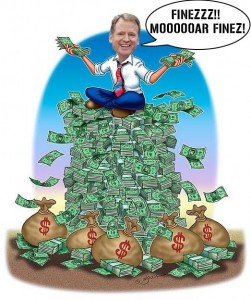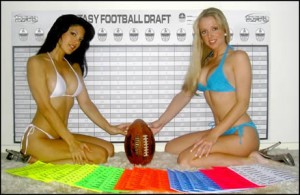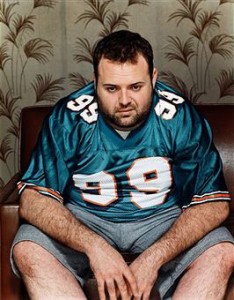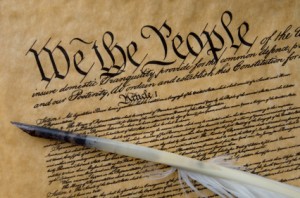Commissioner’s Corner: Competitive Balance
In a recent decision, the NFL levied fines (by lowering their salary cap and distributing the difference to all other teams) against the Redskins and Cowboys because they set up contracts to take advantage of the no-cap season. Here is what the NFL said:
The Management Council Executive Committee determined that the contract practices of a small number of clubs during the 2010 league year created an unacceptable risk to future competitive balance, particularly in light of the relatively modest salary cap growth projected for the new agreement’s early years. To remedy these effects and preserve competitive balance throughout the league, the parties to the CBA agreed to adjustments to team salary for the 2012 and 2013 seasons. These agreed-upon adjustments were structured in a manner that will not affect the salary cap or player spending on a league-wide basis.
Basically, what happened was that teams (most of them, just these 2 more than others) front loaded player contracts — Payed a lot of money in the uncapped year in exchange for paying less in the capped years. There are a couple of issues here that I’d like to point out:
1) This happened in 2010 and was obvious to anyone who even glanced at the numbers. So much so that, supposedly, the NFL even warned these teams (verbally) that they shouldn’t be doing this. This penalty is only happening now.
2) Does this really create a big enough competitive imbalance in the league that it needs to be corrected.

For the first point, there was a whole CBA negotiation that happened last year (remember the lockout?) and the cap was set up, but there was no talk about the redistribution against the Cowboys/Redskins. Didn’t want to bring it up that some teams were willing and able to spend money and the others were probably colluding to keep salaries down. And now in 2012 when the calculation for the cap is being done based on last years revenue, it looked like it was going to go down. Well how do you explain that to players… you can’t. So with a quick “fix,” the “problem” is “solved.”
As to the second point, let’s look at the teams numbers for 2009, 2010, and 2011. That’s what’s good about the delay/inaction by the NFL on this issue. In our baseline year of 2009, the Cowboys were pretty good, making the playoffs but losing in the NFC championship game. On the other hand the Redskins went 4-12. In 2010 even while spending millions more than other teams, both teams went 6-10 and were at the bottom of the division. Last year the Cowboys were slightly improved at 8-8, but the Redskins were slightly worse at 5-11.
So compared to our baseline, the Cowboys had, on average, 4 less wins, and the Redskins had 1.5 more wins. Or, when combined, 2 and a 1/2 less wins. Or just looking 2009 and 2011 since front loading contracts should give more advantage in a capped year, the are a combined 2 less wins. So much imbalance!
But the tough question is to whether this would actually create a real imbalance in future years, and that would be tough to compare. This future imbalance is what dynasty/keeper fantasy commissioners (and the real NFL commissioner) have to deal with all the time with trades that involve future draft picks and young players. If you really were going for a perfect balance, a baseball trade involving a minor league player or any deadline trade involving future draft picks would never be allowed. Of course, trades like this actually happen and are justified by saying that the opportunity was there for all teams. Which brings me back to the uncapped year — an opportunity that was available to all teams. This ruling stinks of collusion and half-assed player pacification.
I think Deadspin sums it up best:
[T]he NFL claims that “the parties to the CBA” agreed on this punishment. Not the CBA itself, mind you, because there’s nothing in there. But the NFLPA signed off on the penalties, not because they agreed with them, but because they had no other choice. The only other option the NFL presented the Players Association was for the salary cap to drop across the league, meaning less money for the players. This was a devil’s bargain: sign off on this capricious and probably illegal sanction of two teams, or we’ll punish all of you. The NFLPA was straight blackmailed, and they did the only conscionable thing they could: they caved, and threw two of the biggest-spending owners under the bus.
In the Book of Genesis, God inexplicably created the tree of knowledge, then told humans not to touch it. “Because I said so,” I believe was the rationale. He made the fruit tempting, and gave humans the faculties to obtain and enjoy it, and got pissed when they did. It took a couple thousand years for people say, whoa, that was pretty cruel and fucked up, God. Similarly, the NFL created an uncapped year, and fostered an atmosphere that gave Dan Snyder and Jerry Jones the motive, the means, and the opportunity to partake of its blessings. The NFL doesn’t have religion’s PR, so thankfully we don’t need iconoclasts, just normal, rational people to point out just how wrong this is. But football is a sort of religion, with a similar antitrust exemption, so fair doesn’t even come into play.


 Hello fellow fantasy commissioners. Welcome to our corner. Here we shall discuss the trials, tribulations, tribbles, and elations of the job of fantasy commissioner.
Hello fellow fantasy commissioners. Welcome to our corner. Here we shall discuss the trials, tribulations, tribbles, and elations of the job of fantasy commissioner.